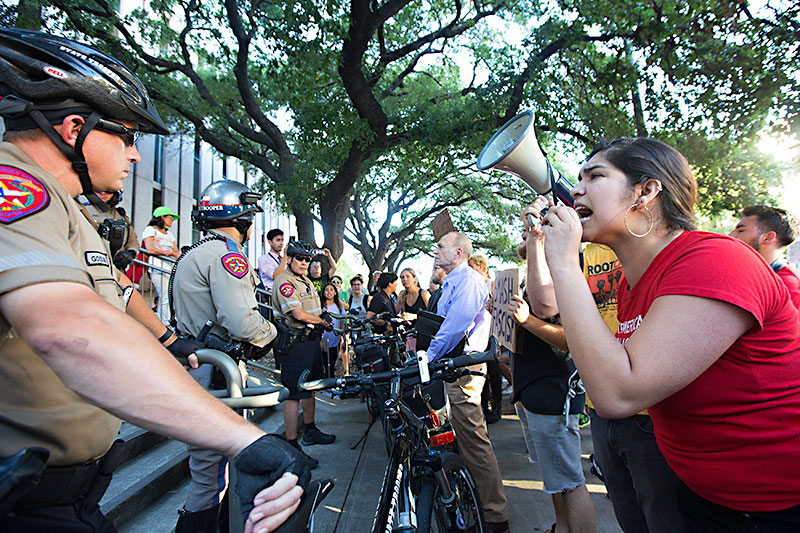Lege Lines: Resistance in the “Sanctuary”
Assessing the fallout after SB 4’s passage
By Mary Tuma, Fri., May 5, 2017

A mixture of bright colors spilled onto the page to convey a solemn message: "Please don't tear my family apart." Outside the doors of the House chamber last Wednesday, rows of children gathered to deliver hand-drawn pictures illustrating the pain Senate Bill 4 would inflict on them to any empathetic legislator willing to accept. (Never mind the string of conservative lawmakers who cowardly sidestepped the children's callouts.)
Inside the chambers, those voices were amplified by Democratic lawmakers who stood in solidarity to offer passionate and oftentimes tearful remarks against the so-called "sanctuary cities" bill, legislation that punishes cities and law enforcement officials who do not fully comply with federal immigration policy. Dems also filed dozens of amendments aimed at creating safe spaces for the already vulnerable. Proposals to exempt campus police, and inquiries at domestic violence shelters, medical centers, and extracurricular school activities, and to exclude children from interrogation about their immigration status all failed along (mostly) party lines, drowning any sense of compassion for the immigrant community. "If you've succeeded in one thing, you've succeeded in terrifying a whole community," said Rep. Rafael Anchia, D-Dallas, chair of the Mexican American Legislative Caucus. "This feels like a dark day in the House."
And indeed it was. At around 3am the following morning, the House passed a version of the bill even harsher than what was originally offered – an amendment by conservative Rep. Matt Schaefer, R-Tyler, allows law enforcement to ask about a person's immigration status when merely detained, as at a routine traffic stop, rather than arrested, as the Senate's version detailed. The measure effectively turns Texas into a "Show Me Your Papers" state like Arizona, and allows racial profiling and discrimination.
Police chiefs and sheriffs have been steadfast in their opposition to a bill they say will drain precious resources, undermine trust, and prevent victims of abuse from coming forward – the amendment added fuel to their fire, as evidenced by multiple joint op-eds recently published in major dailies. "To have this be a question asked during a detention is not something I support or makes the community more safe," said Austin Police's interim Chief Brian Manley after the initial vote. "All it could do is stand to create a wedge between police departments and communities if we are to be seen as an arm of immigration enforcement."
As if waking from a nightmare, betrayed Democrats addressed their Republican colleagues upon final passage of the bill the following day, assuring their counterparts that existing friendships had been broken. "It's very hard for me to look at you all because I'm filled with a lot of sadness and anger," Anchia scathed. Despite overwhelming opposition, the Senate on Wednesday approved SB 4, ushering it through to Gov. Greg Abbott's desk. As one of the governor's "emergency" items this session, a signature seems inevitable.
However, that didn't deter local activists, who on Monday staged an all-day sit-in at the State Insurance Building (the place of Abbott's office). Austin City Council Member Greg Casar, Austin Community College Trustee Julie Ann Nitsch, Rev. Jim Rigby of St. Andrew's Presbyterian Church, and more than a dozen others defiantly refused to leave the building until Abbott vetoed the measure. Activists ended up in plastic handcuffs and were slapped with citations for criminal trespassing.
For Casar, a vocal opponent of anti-immigrant policies, the protest serves as one of many acts of resistance to come. "It's not over once he signs it," he told the Chronicle Monday, while blocking the Insurance Building's doors. "He will have to meet protests and sit-ins like this one time and time again. And I'm going to call on cities and counties across Texas to fight against SB 4 – in terms of litigation and preventing our police departments from being agents of deportation."
The courageous act of civil disobedience should empower us to be honest – as journalists, activists, and members of the progressive community – and call SB 4 squarely what it is: an attempt to pander to a bigoted primary base; a measure that demonizes and scares immigrant communities into the shadows; a blatantly racist policy meant to perpetuate white supremacy.
But SB 4 should also be seen as part of a more grandiose GOP objective: As Democrats noted on the House floor last Wednesday, six separate judicial opinions have found that Texas intentionally discriminated against minorities (among them: the voter ID law and congressional maps). SB 4, they argued, is a continuation of that racist pattern. While we can no longer count on state leadership to veer from its narrow path, with an expected lawsuit looming and more protests in the works, we can at least revel in the resistance.
Got something to say on the subject? Send a letter to the editor.










